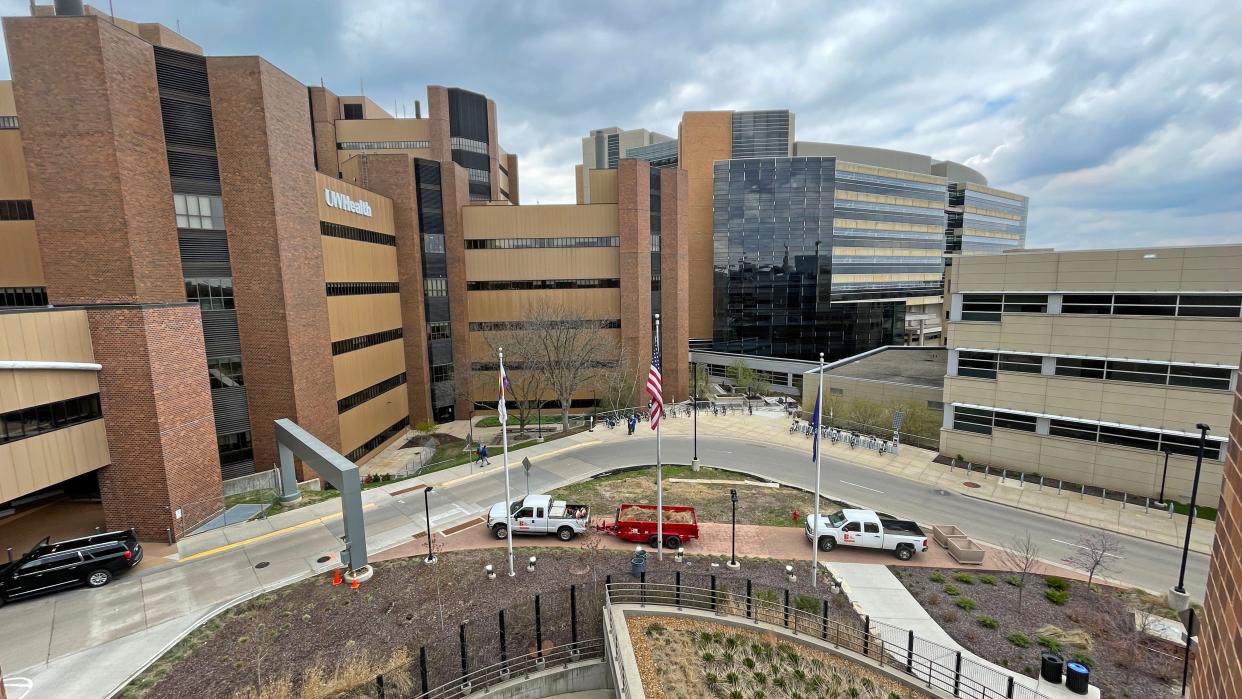Here's why UW Health nurses lost their union contract and efforts to get it back

- Oops!Something went wrong.Please try again later.
- Oops!Something went wrong.Please try again later.
- Oops!Something went wrong.Please try again later.
UW Health nurses again are turning up the heat at Madison's largest hospital over wage caps and greater pay transparency.
Its demands come one year after the nurses' union threatened a three-day strike if the union wasn't recognized by the hospital.
Here's a quick glance at the history for union recognition and greater bargaining power, the issues at hand and lingering legal questions:
UW Health's nurses union was dissolved in 2014
Former Republican Gov. Scott Walker signed Act 10 into law on March, 11, 2011. The highly contentious bill eliminated most collective bargaining rights for public workers.
It saved the state billions of dollars by requiring public employees to pay more for their health insurance and pensions and took away much of the say government employees had in their workplaces, kicking off a rapid decline in union participation.
In 2021, unions in Wisconsin claim 137,000 fewer members in the public and private sector than they did a decade ago, according to a Milwaukee Journal Sentinel article that analyzed the impact of Act 10 on its 10-year anniversary.
Act 10 allowed the nurses' contract to remain in place until it expired in 2014.
UW nurses attempt for a union after the pandemic
Burned out from the COVID-19 pandemic and increasingly working short-staffed — a trend occurring across the state and country — UW nurses began to question whether their ability to form a union was covered by Act 10.
The 2018 election had ushered in Democrats Gov. Tony Evers and Attorney General Josh Kaul. The change in party leadership renewed a push by the nurses to seek the union they had lost when their contract expired.
Evers met virtually with roughly 400 nurses in early 2022, listened to their concerns over patient safety and retention. He asked Kaul to research whether University of Wisconsin Hospitals and Clinics Authority can voluntarily engage in the collective bargaining process with its nurses.
AG Josh Kaul said UW's hospital system doesn't have to engage in collective bargaining with nurses
Kaul issued a formal opinion in June 2022 that said University of Wisconsin Hospitals and Clinics Authority can voluntarily engage in the collective bargaining process with its nurses, but it isn't required to do so.
It can but it doesn't have to — that's the legal rub that continues to stand between the nurses and the hospital's top administrators. Two months after Kaul's formal opinion was released, the nurses threatened a three-day strike if its union wasn't recognized by the hospital and hospital authority.
Gov. Evers in 2022 got both sides to agree to avert a strike. What can nurses now do?
Before the agreement, or memorandum of understanding, nurses couldn't display union materials or talk about forming a union. Now, they can.
The nurses now also have a voluntary union that's recognized by the hospital. Members pay dues.
Of the 4,500 nurses employed by all UW's clinics and hospitals, 3,600 are frontline nurses and roughly 2,900 are not in management and are eligible to join the union. The union isn't releasing membership specifics, only saying it's "in the hundreds."
The agreement gives the union direct access to hospital administrators through newly created "meet and discuss" committee meetings. These meetings have been held for two hours every other month.
Nurses now are able to bring another nurse with them into disciplinary meetings, a practice common in union workplaces known as peer support.
What isn't the union able to do?
The union doesn't have the power to collectively bargain with hospital management for a contract, a key power and purpose of unions.
Nurses have been using the meet and discuss committee to pursue wage and salary demands. They aren't satisfied with the progress.
What do the two sides still disagree on?
The two sides agreed to pursue an analysis from the Wisconsin Employment Relations Commission on whether the health system is required by law to recognize and collectively bargain with an employee union and, if it's not required to, if the hospital can do so voluntarily.
In November, the commission ruled the hospital system isn't required by law to negotiate a collective bargaining contract or recognize its recently created nurses union.
Both sides sought more legal clarity.
UW Health subsequently petitioned the Wisconsin Supreme Court to obtain legal clarity on that same question. Court officials announced in February they wouldn't take up the case.
The nurses union appealed the ruling issued by the WERC.
What's next?
The case is pending in Dane County Circuit Court. A ruling that found the hospital system legally can recognize the union and engage in the collective bargaining for a contract would be viewed as a win by the union.
Jessica Van Egeren is the Milwaukee Journal Sentinel's enterprise health care reporter. She can be reached at jvanegeren@gannett.com or (920) 213-5695.
This article originally appeared on Milwaukee Journal Sentinel: UW Health renew efforts for wage compensation, more union negotiating power

